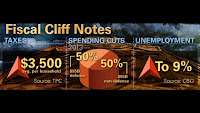 Federal income tax rates are scheduled to increase in 2013, with tax brackets currently spread from 10%-35% changing to 15%-39.6%. Long term capital gains will increase from 15% to 20%, and other long term capital gains tax rates which apply to qualifying dividends will be taxed as ordinary income.
Federal income tax rates are scheduled to increase in 2013, with tax brackets currently spread from 10%-35% changing to 15%-39.6%. Long term capital gains will increase from 15% to 20%, and other long term capital gains tax rates which apply to qualifying dividends will be taxed as ordinary income.The 2% reduction in the payroll tax for Social Security will expire, something which concerns many businesses.
Estate taxes will return to 2001 and the $1,000,000 exclusion for taxes, and the top tax rate increases from 35% to 55%. (In 2001, there weren't nearly as many $1,000,000 properties to inherit as there are now.)
Earned income tax credits, child tax crfedit and the Hope tax credit will revert to lower limits.
Student loan interest will no longer be deductable after the first 60 months of repayment.
Have you been affected by the Alternative Minimum Tax? the exemption amounts will be lowered, affecting many more individuals (a tax that was only supposed to affect the highest income earners has been affecting more and more of the middle class).
Will tax rates for income earners under $200,000 or $250,000 (households) annually change, or will the tax rates for the vast majority of Americans be impacted as well?
And, once again, there are issues about the "debt ceiling", and what measures may have to be enacted in order to allow the government to meet its obligations.
The Mortgage Debt Relief Act is also set to expire; this act is what allows short sale sellers and individuals who took out a mortgage in a certain time period and were foreclosed on under certain conditions to not be taxed on the forgiven or cancelled debt. Should this Act not be extended, the tax burden of many distressed sellers will be increased.
And, last but not least, there is the issue of whether the mortgage interest deduction will continue and in what form--In California 89% of those who took the mortgage interest deduction earned less than $200,000. Losing the deduction would cost the average California taxpayer over $3,900.
Are you concerned? I hope you are and that you contact your Congressional representative to express your opinion.
www.juliahuntsman.com
www.longbeachrealestate.blogspot.com
www.facebook.com/longbeachhomesandcondos

No comments:
Post a Comment